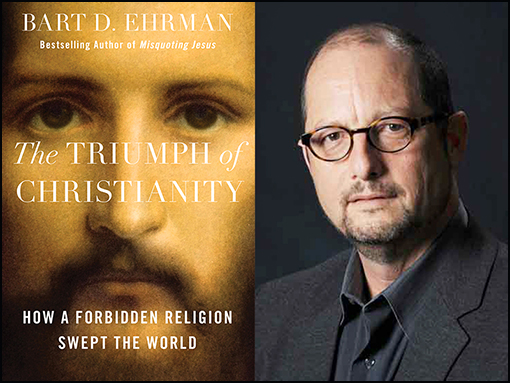921 Christianty, warts and all
There is a terrific new podcast on
Sam Harris’ website, he speaks to Bart Ehrman about his experience of being a
born-again Christian, his academic training in New Testament scholarship, his
loss of faith, the most convincing argument in defense of Christianity, the
status of miracles, the composition of the New Testament, the resurrection of
Jesus, the nature of heaven and hell, the book of Revelation, the End Times,
self-contradictions in the Bible, the concept of a messiah, whether Jesus
actually existed, Christianity as a cult of human sacrifice, the conversion of
Constantine, and other topics.

Bart D. Ehrman is the author or
editor of more than thirty books, including the New York Times bestsellers
Misquoting Jesus and How Jesus Became God. Ehrman is a professor of religious
studies at the University of North Carolina, Chapel Hill, and a leading
authority on the New Testament and the history of early Christianity.
He has been featured in Time, The
New Yorker, and The Washington Post, and has appeared on NBC, CNN, The Daily
Show with Jon Stewart, The History Channel, National Geographic, BBC, major NPR
shows, and other top print and broadcast media outlets. His most recent book is
The Triumph of
Christianity.
This talk is hugely satisfying
for anyone who is interested in religion-for-the-non-believer. I have many essays on the topic, RELIGION 1, 2, 3 and GOD 1, 2, 3, 4, 5, 6 as well as SCRIPTURE in my book en.light.en.ment

Religion News:
New Testament scholar Bart Ehrman
became a superstar on the heels of his popular trade books debunking long-held
assumptions about Christian Scriptures.
With titles like “How
Jesus Became God,” “Forged”
and “Misquoting
Jesus,” he gained a devoted following of fellow agnostics, atheists and
ex-Christians.
They may not appreciate the title of
his newest book, “The
Triumph of Christianity: How a Forbidden Religion Swept the World,” which
is set to be released Tuesday (Feb. 13). In it, Ehrman tries to explain a
long-puzzling historical drama: How did 20 or so Jesus followers come to
convert much of the world in the space of 300 years? (Sociologist Rodney Stark
published a book of the same
title in 2011.)
Most of the research into the first
few centuries after Jesus’ crucifixion around the year 33, he concedes, is not
new. Scholars have been grappling with how Christianity exploded on the scene
for a long time. Ehrman’s goal is to bring that issue to the masses in plain
English, marshaling the evidence — most of it written in Greek and Latin
— and crunching the numbers.
True to form, Ehrman, a professor at
the University of North Carolina at Chapel Hill, doesn’t exalt in
Christianity’s success, despite his new book’s title. “In this book I have
tried to explain the triumph of Christianity without making it a triumphalist
narrative,” he writes. (As someone who has written 20 books for lay readers,
Ehrman may know something about what titles are likely to sell.)
Goodreads:
From the New York Times
bestselling authority on early Christianity, the story of how Christianity grew
from a religion of twenty or so peasants in rural Galilee to the dominant
religion in the West in less than four hundred years.
Christianity didn’t have to
become the dominant religion in the West. It easily could have remained a sect
of Judaism fated to have the historical importance of the Sadducees or the
Essenes. In The Triumph of Christianity, Bart Ehrman, a master explainer
of Christian history, texts, and traditions, shows how a religion whose first
believers were twenty or so illiterate day laborers in a remote part of the
empire became the official religion of Rome, converting some thirty million
people in just four centuries.
The Triumph of
Christianity combines deep knowledge and meticulous research in an
eye-opening narrative that upends the way we think about the single most
important cultural transformation our world has ever seen—one that
revolutionized art, music, literature, philosophy, ethics, economics, and law.